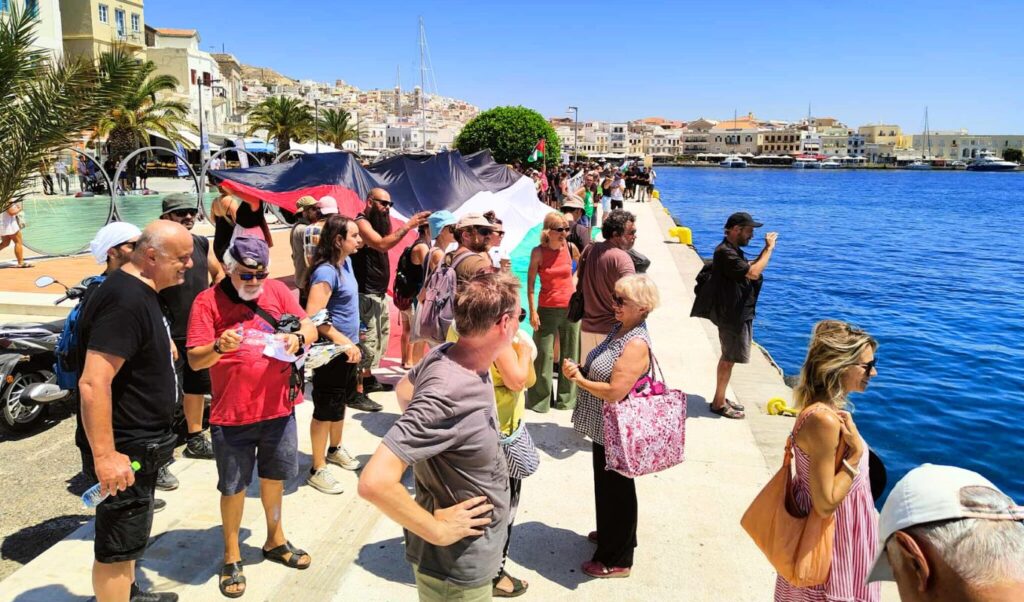Recent incidents involving protests against cruise ships carrying Israeli tourists constitute isolated actions that do not appear to concern representatives of Greek tourism at the market level, as they describe them as regrettable social phenomena rather than industry threats.
Israel has remained a significant player in the Greek tourism market in recent years. In terms of incoming tourism, arrivals ranged between 1 million and 1.5 million in the post-COVID era, making it the 8th largest international market for Athens Airport (2023 data).
2024 recorded over 900,000 Israeli tourists, with revenues reaching 419 million euros, while preliminary estimates for 2025 so far show increased airline ticket bookings, particularly for the summer season. Athens and Thessaloniki lead in demand, while recent years have seen growth in Crete, Rhodes, Santorini, Mykonos, Zakynthos and certain mountain destinations like Arachova, Zagori and Konitsa.
Most Israeli tourists choose Greece for tourism
One only needs to observe how the majority of Israeli tourists choose Greece for tourism, entertainment and shopping – a factor that certainly influenced SKY express management’s recent decision to include Tel Aviv in its network.
This move shows that flows from the Israeli market continue despite current geopolitical turbulence, while it is evident that Greece-Israel relations are strengthening commercially and business-wise, as Israeli business activities in Greece, particularly in Athens, are rapidly increasing. Regarding the social and political dimension of the issue, “P” sought the opinion of international relations expert Giorgos Lykokapsis, who emphasizes: “The mobilizations occurring at the country’s ports, during tourist season, by pro-Palestinian demonstrators protesting the arrival of cruise ships expected to disembark Israeli tourists, are unprecedented. The government, after initial hesitation, began addressing them dynamically, even characterizing them as ‘anti-Semitic,'” Mr. Lykokapsis initially states. “In reality, this is an issue with multiple dimensions.
Regarding the accusation of ‘anti-Semitism,’ Greece has been a pole of attraction for Israeli tourists for years, without ever seeing anything similar. Indeed, we did not see such mobilizations even during the nearly two years since the Gaza war outbreak, despite multiple accusations against the Israeli state for ‘war crimes’ in Gaza (including from The Hague Court and other credible international legal circles).
It should be noted that after the Gaza war outbreak, there were isolated incidents of harassment of Israeli tourists and some vandalism of establishments frequented by Israeli tourists (for example, related incidents have been recorded in Exarchia). However, the events we saw at the ports never existed before, without underestimating the possibility of new anti-Semitism emerging if these demonstrations become derailed. Another aspect of the issue is certainly the intensifying reactions against Israel in the West, including the USA,” Mr. Lykokapsis further comments.
When the alliance with Israel began
As he explains, “European and Western countries that can hardly be characterized as hostile to Israel are already taking initiatives ranging from imposing sanctions on Israel, banning entry to ultra-nationalist ministers, to recognizing a Palestinian state. Another aspect is Israel-Greece relations, which have taken on alliance characteristics in the Mediterranean, given the intensifying Israel-Turkey rivalry, despite the fact that our country recognized the State of Israel relatively recently, specifically under Constantine Mitsotakis. It should be noted that this alliance began with George Papandreou and continued under Antonis Samaras, as well as the country’s first left-wing government under Alexis Tsipras, something that would have sounded unthinkable a few years before he was sworn in as prime minister in 2015 (it should be noted that Mr. Tsipras recently called for sanctions against Israel).
The final aspect of the issue is that, despite the support for Palestinians observed in a large part of Greek public opinion, there is also a significant segment that is openly pro-Israel, overlooking even practices denounced worldwide as genocide. Something that would also have seemed unprecedented a little earlier, demonstrating how ideological constants of the recent past have changed…” he further notes. “Israel constitutes a privileged market for Greek tourism, especially when the latter has lost the (formerly) privileged Russian market following sanctions after the Russian invasion of Ukraine.
On the other hand, a (let’s call it alleged) genocide cannot fail to provoke social and activist reactions, which of course cannot be tolerated by the State if they escalate into acts of violence,” Mr. Lykokapsis concludes.
*Published in Parapolitika newspaper




